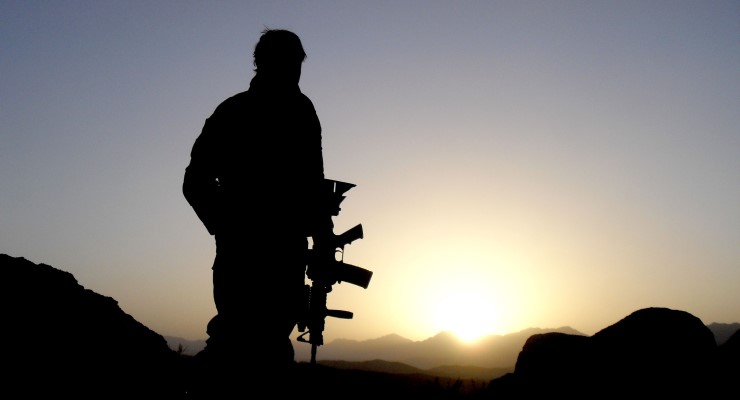
Note: this story mentions suicide.
The Royal Commission into Defence and Veteran Suicide begins public hearings today — and it is desperately needed. At least 1200 serving and former Australian Defence Force (ADF) members have committed suicide in the past two decades.
The royal commission must focus on the common thread linking these suicides: the culture and practices of the ADF that create conditions for abuse to occur and that then further traumatise victims who report it. The deaths are not just the result of combat trauma; they also occur as a result of abuse within the ADF — soldiers abusing each other.
Australian Research Council-funded research at the University of New South Wales focused on ADF members who were abused by other ADF personnel (from 1970 to 2020). Abuse — physical, mental and emotional — continues to be a regular feature of the culture within the ADF and its effects on victims are real.
Our research has revealed a particular pattern of abuse within the ADF that we have called the “second betrayal”. This is abuse via administrative systems and processes inflicted on the victim by those with power in the ADF after they report abuse. At its simplest, this is secondary abuse that occurs because a member has complained about the first abuse. The perpetrators are senior non-commissioned officers and officers who are meant to be looking after their soldiers, sailors and aviators.
A range of abuses occur. Whisper campaigns that target the survivor begin — often because the complaint is “leaked” to the perpetrators or others in the unit. Suddenly they are singled out for “special” duties or, worse, excluded and ostracised. Survivors are gaslit by those they report to: questioned about complicity in their own assault; asked if it wasn’t just “all a bit of fun”; warned they will be investigated; asked if they really want to “destroy” the perpetrator’s career.
These techniques of denial and minimisation will be familiar to many. When the survivor pushes for action, reports are lost, witnesses forget what happened and the “system” takes as long as possible to resolve anything.
The hierarchy turns on the survivor. Many we spoke to talked of commanders telling them they “were going to break them” as a result of the initial complaint. This manifests via the differential application of the formal rules on the survivor versus everyone else.
Minor transgressions that would normally be overlooked or the subject of low-level admonishment — being a few minutes late, having your kit not perfect — suddenly become formal charges. This singling out for punishment is legitimate and “within the rules” — but the survivor and everyone else knows why it is being done: to “get them”.
This pernicious application of the rules cannot be challenged by the victim. Not surprisingly, survivors can quickly accrue many charges, poor reviews and disciplinary action.
Further, the survivor is treated like a rat because they have broken the code of silence that is a strong informal norm of the ADF: you don’t “go jack” on your mates. Social exclusion follows and often leads to further bullying: uniforms tampered with; rooms messed up before inspections; vital components of kit going missing. These compound the trauma of the first assaults, isolate the survivor further and often lead to further charges against the survivor — as they are no longer performing at an appropriate level.
The survivor is now alone, isolated and the target of constant low-level abuse, with no way out nor avenue of complaint. Imagine how powerless and vulnerable this leaves them.
No doubt the ADF will claim it has changed its cultures of abuse and fixed its systems, yet we have distressing footage of an assault last year. You might be shocked by the footage but for me it is the same as hundreds of other stories and reports over the decades: abhorrent — yes; unusual — no. Even ADF chaplains are being investigated for harassment and bullying.
The Australian National Audit Office (ANAO) released a damning report on the ADF’s 10-year change program, “Pathway to Change”, that is meant to have fixed the culture problem after the last set of reviews and inquiries in 2011. Then there is the Brereton report into alleged war crimes in Afghanistan that devotes an entire chapter to the problem of ADF culture.
If there is to be real reform, the ADF needs to accept that it has a deeply entrenched cultural problem — and fix it. Sadly, another finding of the research is that the ADF is very bad at fixing its problems.
James Connor will give evidence to the royal commission today.
For anyone seeking help, Lifeline is on 13 11 14 and Beyond Blue is 1300 22 4636. In an emergency, call 000.








Crikey is committed to hosting lively discussions. Help us keep the conversation useful, interesting and welcoming. We aim to publish comments quickly in the interest of promoting robust conversation, but we’re a small team and we deploy filters to protect against legal risk. Occasionally your comment may be held up while we review, but we’re working as fast as we can to keep the conversation rolling.
The Crikey comment section is members-only content. Please subscribe to leave a comment.
The Crikey comment section is members-only content. Please login to leave a comment.